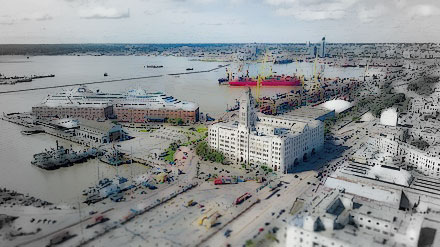Autumn’s southern hemisphere succumbed reluctantly to the rainy, grey-filled skies of winter, which in turn deferred to the next succession of seasons. The Atlantic seas bordering the Uruguayan coast grew more passive with each passing day, pounding benignly at the ancient sea wall which kept vigilant its protection of Montevideo’s Mancha Negro section.
Walking its streets in apparent oblivion trod Seidel and his son, making their daily jaunt to Cohen’s apartment. Arriving precisely at their designated time, week after week, month after month, the door would open, and in would walk Hans, his hair neatly combed, his lunch tucked under his arm. On occasion, when the door opened wide enough for Seidel to peer in, he’d find himself mildly bewildered at the strange physical metamorphosis taking place inside. About the room, Cohen had placed large, color-coded placards on specific parts of furniture. Simple mathematical equations in the form of large black dots centered each placard. Additionally, Seidel spied rough-hewn drawings of eyes, noses, ears, and hands dangling over bowls of fruits and knickknacks. And always, the calming resonance of Brahms played in the background.
The final portion of that morning routine always ended with a curt dismissal and the slamming of the door. But Seidel smiled inwardly, clearly pleased by the progress he’d been seeing. Whatever witches’ brew the professor has concocted was clearly working. Hans was becoming much more vocal, and his ability to follow multiple tasks was clearly a miracle, according to his father.
However, what was even more astounding was Han’s relationship to Professor Cohen. Oftentimes while returning home, the boy would break out into a wide smile. “Papa, Professor Cohen said I’m a good student. Yes, he really said that. He said I’m a good student.”
Upon hearing the news, Seidel, as always, would pull the boy closer to him, ruffling his blonde hair as they continued their journey home. But today was different. This, quite possibly, could be the last time he might ever hold his child again. The pall of Hans’ tutelage under Cohen was coming to an end tomorrow. On December 10, the ex-S.S. officer was expected to keep his part of the bargain, though Cohen had not spoken of it since their initial conversation. Seidel had attempted on several occasions to discuss this with Hans, but each time he looked deeply into his child’s questioning eyes, he stopped, overcome with emotion.
Yet, despite this setback, Seidel was confident that he’d be able to rectify everything if he could pull off the next scenario of his plan; one that even Cohen could not have fathomed.
* * *
The entire incident was over in less than twenty minutes. Two police officers and a representative of the German embassy had gathered at Cohen’s apartment in what turned out to be a sweltering December morning. Seidel himself had called them earlier to arrange for his arrest. At precisely 9 a.m., Seidel knocked on the door. He was not alone however. Hans had accompanied him.
Surprised by Hans’ appearance, Cohen was about to speak when Lieutenant Manual Ortega of the municipal police interrupted. “Eric Seidel… are you Eric Seidel?”
Seidel merely nodded, confirming Ortega’s query. The officer and his subordinate, a Sergeant Gomez, stepped towards him, followed by the embassy official. As they huddled in a corner of Cohen’s apartment, murmuring over the extradition process, the professor signaled Hans over to him, offering him a seat in the kitchen. Then, rummaging around for a pencil and paper, he presented it to the boy. “Here, draw me a nice sunset today.”
“Are we having class today, Professor?”
“Uh, I’m afraid not, Hans.” Cohen stared beyond the boy, watching the proceedings of the four men. A pair of handcuffs appeared from the sergeant’s waistband, but Ortega, sensitive to the situation, placed his hand atop Gomez’.
“I don’t think we need to do this right now.” He jerked his head in the direction of the boy.
Seidel also gazed at his son, concern narrowing his features. “Please, may I have some time to speak with my son and Professor Cohen?”
Ortega stared back at Seidel, sensing the pain of the young father. “Okay, I’ll give you two minutes. Gomez, take him over there, will you?”
Cohen stood up as Seidel approached. “I assumed you had made arrangements for the boy.”
“Do not be concerned.” Noting that Hans was engrossed in his sunset, he continued. “Someone will be picking up Hans at your apartment within the next hour. And in three days’ time, he’ll be returned to Germany. My sister-in-law will be awaiting him.” Reaching out and taking Cohen’s hand in his, Seidel added, “Words cannot express what you’ve done for my son. I’ve asked a lot of you and… knowing how the situation was between us… I owe you so much.” And how I wish I could tell you of my true intentions, but I dare not take the chance.
“You’ve kept your word. You owe me nothing.” Turning his head so as not to meet Seidel’s eyes, Cohen added awkwardly, “And… uh… strangely enough, I feel the need to thank you. You’ve given me back the need to contribute to this world again; to think, to create, to help others. These past six months have reinvigorated my soul. Therefore, I…”
“Senor Seidel,” came the lieutenant’s voice from across the room. “It’s time to go.”
“Yes, yes, of course.” Seidel bent over the occupied Hans and softly kissed his hair. “I love you,” he whispered.
Standing to his full height and running a hand over his wrinkled shirt, he announced, “I’m ready.”


